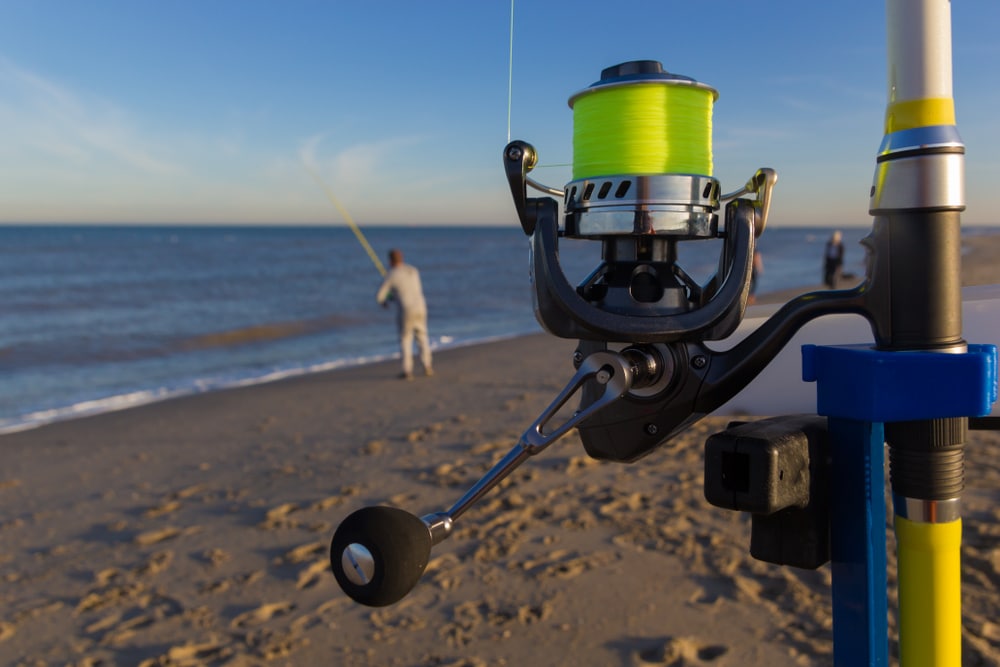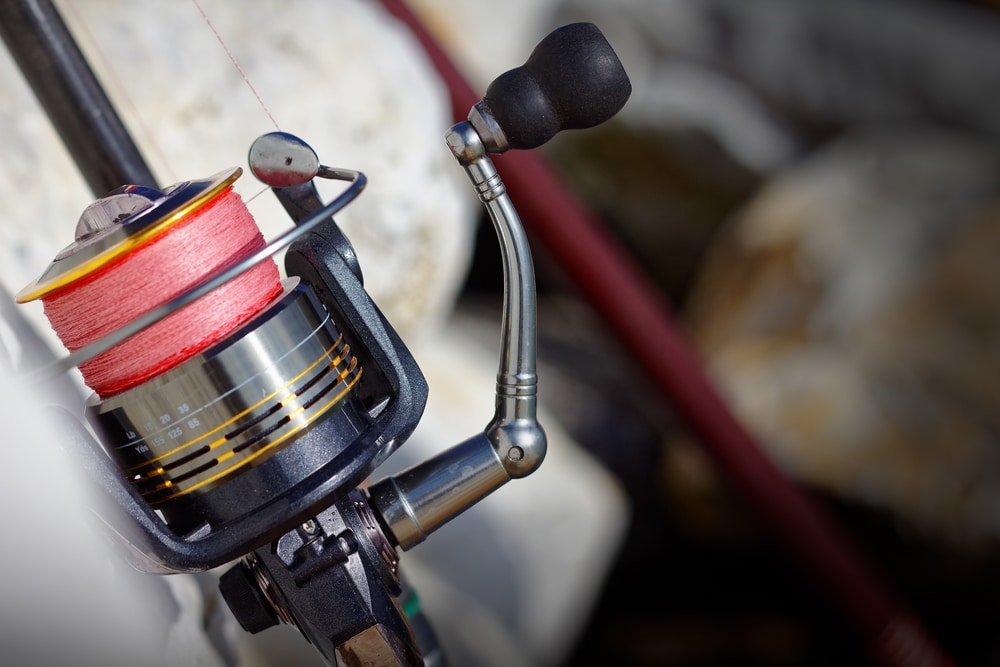How to clean a fishing reel is a question we hear a lot.
Fishing reels are made to handle some water exposure but any type of grit – sand, mud, dust – will affect the quality and performance of the reel and most likely that will happen when you need the reel the most.
How you clean a fishing reel depends on what you are cleaning off the reel.

Contents
Cleaning Mud and Gunk Off Your Reel
If you have mud or gunk on the outside of the reel, use a gentle stream of running water, such as you will find at a medium setting in your kitchen faucet.
The water stream should not be harsh as you don’t want to drive dirt, sand, or grit, into the fishing line or between the line on the arbor.
Once the crusty bits are off, take a soft cloth or paper towel and wet it. Gently scrub the metal surface of the reel to clean off the residue.
If the substance is oily, you can apply a drop of soap such as Marine grade Simple Green cleaner to lift the oil.
All you need is a drop, and you will have to make certain that you rinse off all of the soap or cleaner.
Failure to get the soap or cleaner off the real does three things.
First, it can cause a reaction with the metal and encourage rusting.
Second, it will eventually make it onto the fishing line which will then create a chem trail in the water that will cause fish to avoid your line.
Third, it can weaken the line and cause it to become brittle.

Cleaning Grit, Mud, and Grime from Inside the Reel
Again, your best friend for cleaning mud and grime from inside the reel is clean water.
Take the reel apart, by removing the drag cap and cleaning under it.
Remove the arbor and clean inside the space where the spool attaches to the shaft.
If there is sand or grit in these areas, use a dry cotton swab and gently remove it.
You can rinse these areas too. Be sure to visually inspect the interior portions of the reel after cleaning.
You may need to grease the moving parts, such as the shaft.
A product such as Penn reel oil or one that is designed for your reel is appropriate.
Note: the working parts of your reel – gears and such, are sealed away to prevent water from getting inside the reel.
So, it is safe to rinse your reel in water. Never use hot water to rinse your reel, always use lukewarm or cold water.
Hot water can cause the seals to loosen and water to get inside at which point the reel is finished.
When Should I Clean My Fishing Reel?
How often should you clean your fishing reel depends on how often you use it.
If you fish one day a week clean the reel once per season.
If the moving parts seem like they are “crunchy” then clean the reel immediately.
You may clean your reel more often as needed, especially if the reel gets wet or you fish more often than a few days per week.
I clean my reels almost every month.
I fish 3-4 days per week and in the summer I fish almost every day.
I make a habit of cleaning the reel before I take a rod out of storage and again at the end of the season.
Most of my fishing rods are dedicated to one species of fish or another.
When trout season ends, I make sure to clean all of my trout reels and maintain the fishing poles.
If I head out to salmon fish, I clean the reel before I go and maintain the rod at that time too.
At the end of the salmon season, I clean the reel again.
I also make sure to maintain the reel throughout the season and especially if it gets wet or feels like it is not functioning as it should.
Removing Corrosion from A Fishing Reel?
Corrosion is a chemical reaction between the metal of the reel and an antagonist, such as salt.
The safest way to remove corrosion is to use a soft approach.
Before you reach for the steel wool, reach for a soft cloth.
You can apply a soft abrasive such as baking soda with water, and try to scrub the corrosion off of the metal.
If that process does not work, move up the technique by using a nylon brush with soft bristles.
If the baking soda and soft nylon brush do not work, move to the same process but use a soft-bristle brass brush.
Steelwool would be the last option.
Remember that because we are talking about a chemical reaction on metal, you should expect pitting damage.
The chemical reaction changes the ionic structure of the metal on the spot and the corrosion you see is degrading the metal’s surface.
Finish up the removal by applying a sealant to the metal.
A short-term sealant is WD-40 but you can also use metal-safe wax too.
Is Wd40 Good Clearer for Fishing Reels?
Using WD-40 is okay to use, but it is not the best product to clean the reel.
It is helpful in removing corrosion from the outside of the reel but should not be used to clean the inside of the reel.
Water is a good option over WD-40 for inside the reel.
WD stands for water displacement and once you get it inside your reel it is hard to get it off the parts.
While WD-40 is amazing as a penetrating oil, it is not a great lubricant. Use a proper lubricant for greasing the interior parts of your reel.
What Happens if I Soak Fishing Reels?
Soaking a fishing reel would be the very last step in cleaning the reel and only if you felt that by not soaking it, you would be throwing the reel away.
Soaking is not recommended nor is it good for your reel.
Soaking can allow water to seep into the inner workings of the reel if there is any kind of degrading of the seals.
Once water gets into the inner workings of a fishing reel, the gears and other moving parts may rust and corrode.
If I Lubricate My Reel What Do I Use?
Penn brand reel oil is a good product and it is designed for use with reels.
There are other brands of oil or grease available and they should be rated for marine use.
Outside of marine oils, you can also use gun oil as a lubricant for fishing reels.
It may be more expensive, but if you have it on hand, it is good to go.
People Often Ask About Using Vaseline on Their Reels. Should You?
Vaseline is similar to grease and it will work okay on moving parts, but unlike reel oil, it will likely not penetrate deeply into the moving areas and that can leave your reel exposed.
It is better to use a reel oil rather than grease. The same is true of lithium grease.
However, with lithium grease, you never want to use it in aerosol form as it contains acetate which may cause more damage to your reel than it prevents.
Lithium grease is available in tube format, and if you have no other option, you could use that with the expectation to clean and re-oil the reel soon.
Caring for Reel Bearings
Do you use grease or oil reel for reel bearings? Actually, most bearings are dry and not greased or oiled.
Unless there is a problem with the bearings there is no need to lubricate them.
Many times if you have your reel professionally cleaned, they will use reel oil on the bearings.
If you feel that the bearings are in need of lubrication, spray reel oil onto them and turn the handle a few times to work it around.
Grease is not recommended.
If you are wondering about the capabilities of Super Lube for your fishing reel, it would be down on the list of options for lubricating your reel.
It is not the same as reel oil, which should always be your first choice.
The benefit of Super Lube is that it will stand up to water and especially salt water, but again reel oil is a better option.







